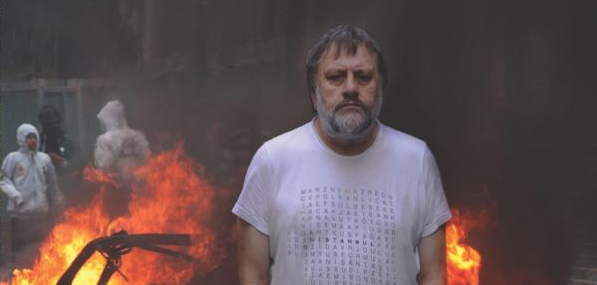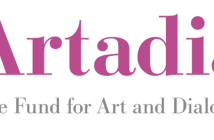This year's theme proposed to take on the very large and daunting question of inequity, in its sexual, economic, racial, medical, cultural manifestations. To the usual roster of activist-artists, for the first time, the summit organizers added a number of speakers with expertise in fields other than art. Many of them were leaders of grassroots social justice organizations, but there were also presentations by a medical doctor, an actor-author and several journalists and documentarians.
What follows are my take-aways from an inspiring and, frankly, exhausting day.
1. We would do well to relearn some protest songs
Kicking off the day, Pablo Helguera performed a Woodie Guthrie song which was eerily evocative of current strife over extreme anti-immigration measures in Arizona and Alabama. Guthrie wrote it in response to news of a plane that crashed while carrying migrant workers back to Mexico once their work on California farmlands was done.
Is this the best way we can grow our big orchards?
Is this the best way we can grow our good fruit?
To fall like dry leaves to rot on my topsoil
And be called by no name except "deportees"?
- Woodie Guthrie, Deportee (Plane Wreck at Los Gatos)
The power of narrative songs to build a sense of community and confidence in the face of trials is remarkable. I wish we sang together more.
2. It's easier to blame the museum than to change the museum
A grumpy, lovable Martha Rosler - clearly not a morning person - spoke about her 1973 Garage Sale exhibit at UC San Diego which recently has been revived at a number of blue-chip European and US art institutions (the Generali Foundation, Vienna and the Museu d’Art Contemporani, Barcelona in 1999; the Moderna Museet, Stockholm in 2004; The Institute of Contemporary Arts, London in 2005). A version of the project, titled Meta-Monumental Garage Sale, will be held in MoMA's Marron Atrium November 17-30, 2012 (as in other places, items are supplied by employees and friends of the museum). Rosler pointed out the irony of charging visitors the $25 museum admission fee to attend what, by nature, should be a free event and stated that it radically changes the piece. So why go ahead with it? Before we cough *hypocrite* behind our white-knuckled fist, think what you would do in her place. Come on, it's freaking MoMA!
... but, by all means, protest - BR&S hears you.
3. Humor is often more powerful than anger
Poor A. L. Steiner tried to rally the audience in a people's mic session to the tune of Pussy Riot videos. Either everyone was asleep, the girls in video had our rapt attention or it wasn't the crowd Steiner's used to: her transparent orange jumpsuit and angry cries to action (which waned to clear annoyance at the room's lack of enthusiasm) got a luke warm reception at best. But the charismatic and seemingly fearless Leónidas Martín had everyone in the palm of his hand. As I watched him give a presentation titled How to Disrupt the Financial Order with Humor, Creativity and a Dash of Mischief, I kept thinking 'how does someone grow up to become like that?' Below is a clip from a gag called Cierra Tu Cuenta (close your account) he pulled on a Barcelona bank.
4. When you can, share a meal with strangers (you don't have to make art about it)
Because I got my ticket last minute, the limited spots at the lunch event were all taken. Creative Time invited Conflict Kitchen, 'a take-out restaurant that only serves food from countries with which the US is in conflict', to serve a 200-person meal. Everyone around me raved about it during the afternoon session. Moral of the story: you're going to the event to meet like-minded and motivated people. You're more likely to meet them at lunch.
5. Don't judge a book by its cover
Tom Finkelpearl was slated as the second keynote speaker of the day. My initial thought as I glanced through the program was 'ugh how boring... what could the Director of the Queens Museum of Art possibly tell this audience?' Well, you know the saying. Finkelpearl gave a very thoughtful, substantive talk on the history of art and activism, first distinguishing between adversarial and exemplary activism (Malcolm X vs. Dr. King) before finding counterparts in art (Santiago Sierra vs. Rick Lowe). To boot, he reconciled the two sides via Monty Python's Life of Brian. He ended with sound advice: "Artists, look to community organizers who create effective organizations. Go from practice to theory and back again."
6. Stay alert
"Don't expect big glad news from me. Things are going pretty bad." To great anticipation, Slavoj Žižek took the stage and reminded us that "the effect of global capitalism is to create a moral vacuum", surmised that "it's easier [for us]to imagine an asteroid hitting Earth than it is to imagine subtle changes to capitalism", called on Rousseau's distinction of amour de soi (self-love) from amour propre (perverted egotism where others are perceived obstacles). Žižek entreated (well, more like bullied) us to fight to keep private paws, government eyes and restrictions away from the Internet. Arguing that we no longer consider the public sphere to be of our concern, to the point of its turning private (we choose not to see), he declared the Web to be the only public sphere remaining. And it's under threat. As you might expect, he has a new book out: The Year of Dreaming Dangerously is now available in bookstores. Watch his full address here.
7. Have difficult conversations
Malkia Cyril won everyone over by sharing the story of coming out to her parents (both Black Panthers): her mother's response was "we've got to go on all the talk-shows." As the founder and Executive Director of the Center for Media Justice (CMJ), a media policy and strategy hub based in Oakland, California, she gave an impassioned talk on racial and economic inequity, individual rights and media freedom (or lack thereof). CMJ defends culture and communication rights for individuals - the right to write - along with a number of grassroots movements that support typically disenfranchised groups. Watch her talk here.
8. Remain for the duration
I had to leave after Žižek's keynote and remained glued to the #CTsummit hash-tag feed for most of the bus-ride home. Don't do it to yourself, you'll want to hear it all.
9. If you're ever invited to present at a #CTsummit: time yourself. Then, time yourself again.
Žižek jokingly asked for a gun to shoot the irritating drummer who'd been designated time-keeper. Most presenters were really thrown by the interruptions that came one minute before they were due to stop speaking, usually just when they'd begun the heated culmination of their argument. Some had the volume turned down on them as they urged the audience to take action and make their voices heard. Oh the irony.
10. Get yourself a Twitter account
Use it as a search engine. Before the day even got underway the #CTsummit hashtag revealed some controversy. Two presenting artists boycotted the event as Palestinian sympathizers because of its live-stream partnership with the Israeli Center for Digital Arts, which is funded by the Israeli government.
But beyond the subtext and parallel dialogue the Twitter feed provides (#2012debate anyone?), there's another reason to get yourself a handle. In the auditorium, surrounded by 500 twitching brains, and watched by 30,000 others around the globe, you'll feel like you're at the center of the World. Uncharacteristic delusions of grandeur will overcome you; everything becomes possible. Then you step outside and the reality of your isolated voice and practice comes crashing down. The summit's curator, Nato Thompson, started off the day crying out "Artists! Are you restling with your basic need for reasonable equity? You are not alone" gesturing to the crowded theater. Twitter certainly can't solve inequity but it can help keep you engaged with a community that cares.
Creative Time organizes its Summit annually in New York City. Live-stream partners broadcasted this year's event at 30 locations around the world. RISD was one of these partners.




